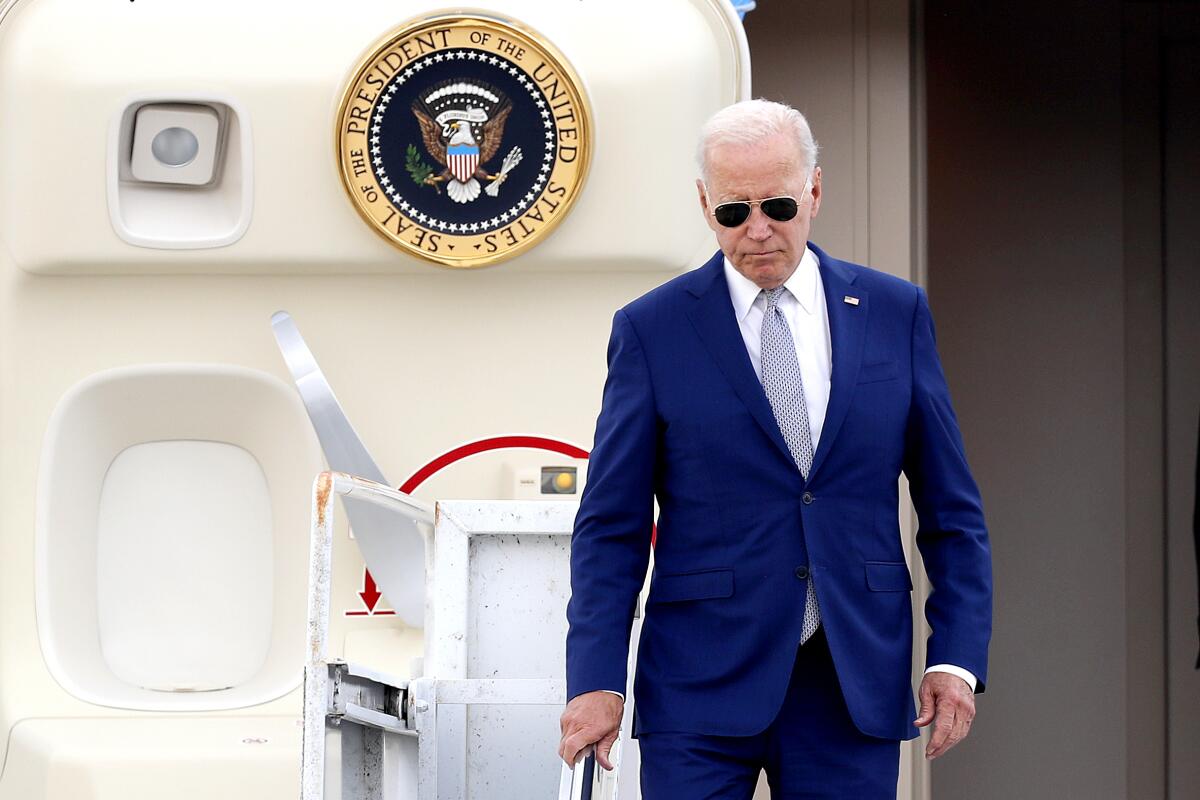One subject hung over Biden’s Asia trip: China’s influence

- Share via
HANOI — On the eve of the final day of a four-day visit to India and Vietnam, President Biden emphasized one point: He is not trying to contain China.
“It’s not about containing China; it’s about having a stable base — a stable base in the Indo-Pacific,” the president said as he answered question after question about U.S.-China relations at a news conference in Vietnam.
“We think too — too much in terms of Cold War terms,” Biden added later. “It’s not about that. It’s about generating economic growth and stability in all parts of the world. And that’s what we’re trying to do.”
But Biden’s message, delivered Sunday night in Vietnam’s capital, only highlighted just how much the subject of China loomed over his trip to the region.
The president spent the weekend at the Group of 20 major economies’ summit in New Delhi, then flew to Hanoi, where the U.S. and Vietnam on Monday formally elevated their bilateral relationship to the highest level. Biden insisted that he traveled to India and Vietnam, which both share a border with China, to strengthen America’s alliances around the world.
The difference between boosting relations with China’s neighbors and building a bulwark against Chinese influence, however, was at times difficult to discern. Biden has pursued deals to strengthen ties with multiple nations in Beijing’s neighborhood, including Japan, South Korea, Australia, the Philippines and even the Pacific Islands. The administration has restricted exports of advanced technologies used for military and surveillance to China and issued an executive order to limit U.S. investment in China. At the G-20 summit, Biden unveiled deals to launch rail and shipping corridors that will compete with China’s expansive global infrastructure investments.
Chinese President Xi Jinping skipped the G-20, and Biden did not meet with him during his swing through the region. The two leaders last met in person on the sidelines of the last G-20 summit in November 2022. Biden blamed the gap between meetings on the “economic difficulties” the Chinese leader is “dealing with.”
Xi is also sitting out this month’s United Nations General Assembly, an annual event in New York City that attracts dozens of world leaders. Biden plans to deliver one of the opening day’s speeches.
The Chinese leader probably had several reasons for skipping the G-20. In addition to his domestic economic troubles, China’s relations with India are at a hostile low point. Xi may have wanted to snub rival Narendra Modi, the Indian prime minister who used the summit as a showcase for his country and himself. But by failing to show up, Xi also ceded the stage to Modi, who was seeking to position himself as the preeminent leader of the global south.
“It is not surprising to see China stepping away from international engagement,” said Andrew Wells-Dang, an expert on Southeast Asia at the U.S. Institute of Peace, a Washington think tank. “But it was a missed opportunity. You would think it would have been in their own interest to attend.”
Elevating the relationship with Vietnam was a calculation also made with China in the background. Vietnam has been sucked into several close confrontations with Chinese vessels in the South China Sea as Beijing — ignoring international court rulings — attempts to assert its control over most of the strategic body of water, through which trillions of dollars in trade passes annually.
Despite fighting a war less than 50 years ago, the Vietnamese and the Americans are on very friendly terms, and Biden formulated the new “strategic partnership” agreement with relative ease. Vietnam wanted protection, while Biden must build and reinforce a coalition of countries in the Indo-Pacific.
“The leaders underscored their unwavering support for the peaceful resolution of disputes in accordance with international law, without the threat or use of force,” Biden said in a joint statement with Communist Party chief Nguyen Phu Trong.
The importance of uniting against China trumped concerns the U.S. has voiced about Vietnam’s human rights record and the fact that the country is ruled by the Communist Party.
“Today, we can trace a 50-year arc of progress in the relationship between our nations, from conflict to normalization,” Biden said after a meeting Trong. “This is a new elevated status that will be a force for prosperity and security in one of the most consequential regions in the world.”
More to Read
Sign up for Essential California
The most important California stories and recommendations in your inbox every morning.
You may occasionally receive promotional content from the Los Angeles Times.















